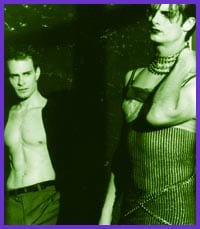Set in New York’s meat-packing district on an extremely hot summer evening, Weldon Rising is an 80-minute-long black comedy that centres on five gay characters and a single homophobe who violently rips into all of their lives.
But it is not a play about unequivocal victimization. Its dynamic is subtle, and all its characters self-incriminating. Told in flashbacks and replays, the story has an immediacy that stings with audacious candour.
Natty Weldon is a closeted gay man whose lover, Jimmy, is stabbed to death by an alluring young stranger. Natty has denied his gayness all his life, even at the moment of his lover’s murder.
The other witnesses are Tilly and Jaye, a neighbouring, beer-guzzling, lesbian couple who think of themselves as “gay men,” and Marcel, a transvestite prostitute, in splediferously vulgar garb and with a wry self-pitying tartness, who speaks of himself in the third person.
This trio epitomizes the internal conflict of queerness – that paradox of not wishing to be identified with the community to which they all belong. They are all lacerated by guilt, but none quite as much as Natty who, in a black beret and a pair of boxers, douses his sweaty body with colognes and recites a litany of place-names where he was once beautiful, “in transit.”
Natty suffers from post-traumatic stress and his inability to come to terms with his own sexual identity exacerbates his desires. In Phyllis Nagy’s compelling script, the dramatic arch between this point and his eventual apocalyptic translation into a man who will finally rise and force his way to psychic freedom is supposed to be drawn with ever-increasing tension and an almost hallucinatory power. Alas, the Eclectic Theatre production, under Jordan Merkur’s surprisingly uneven direction, fails to draw the arch convincingly.
Sound, set and lighting are well evocative of urban sleaze and desperation.
Apart from the insidious insolence of Mehron Paul’s glamourous Boy, there isn’t nearly enough colour or knock-em down power in the ensemble. Scott McCord’s tranny hooker has moments of grotesquely black comedy, but not enough to erase an oppressive sentimentality. As for the lubricious lesbian couple, Torri Higginson’s Jaye is provocatively aggressive, but Melee Hutton’s Tilly is vocally flat and parched.
Hume Baugh’s Natty is often wooden, and so cannot lift the text to its startling climax.
The play shifts from realism to surrealism in a heartbeat, but the uncertain tone of this production often causes the black comedy to be levelled and the more expressionistic moments (including religious parody) to be strained.
Weldon Rising.
$11-$22. 8pm; 3pm Sun.
Till Sun, Mar 19.
Alumnae Theatre.
70 Berkely St.
(416) 366-7723.

 Why you can trust Xtra
Why you can trust Xtra


